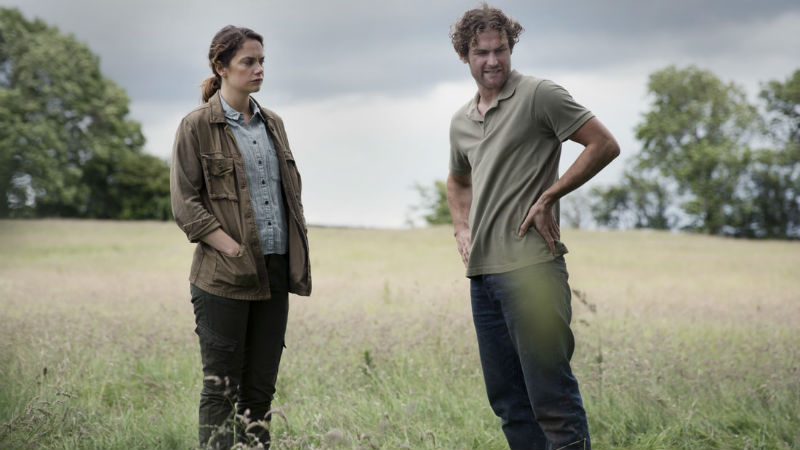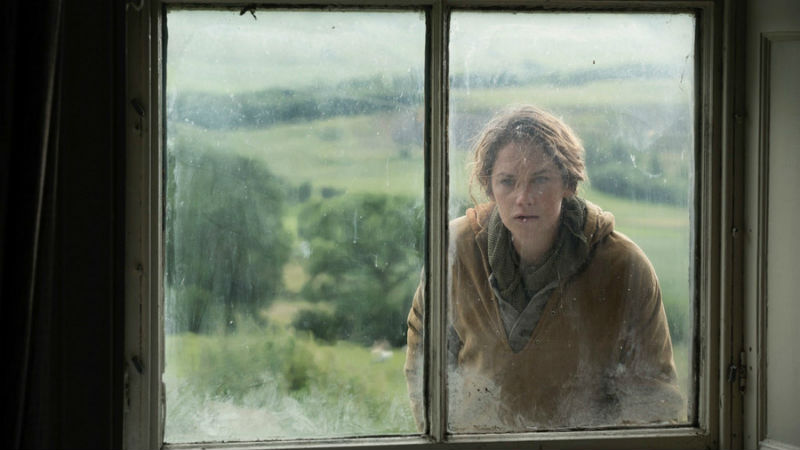Following in the thematic footsteps of Hope Dickson Leach’s The Levelling (2017) and Francis Lee’s God’s Own Country (2017), Clio Barnard’s Dark River offers itself as a comparative text, ensuring a verisimilitude depiction of life in rural Britain. As Alice, actor Ruth Wilson offers a delicateness to a woman haunted by her past, to which is heightened by the director’s choice to merge Alice’s past and present together, resulting in pastness projecting itself into her adult life.
After her father’s death, Alice is obligated to travel back to her family’s Yorkshire farm after 15 years away – her movement elicited through the wide lenses and frames of Barnard and her cinematographer Adriano Goldman. As a means, she faces an uphill emotional and physical battle to restore some working order to the farm after her brother Joe (Mark Stanley) and father (Sean Bean) neglected its running. Only seen through Alice’s perspective, Sean Bean’s physicality imbues the frame with a Gothic quality; in every corner, he lingers. Locked over a tenancy dispute, the brother and sister’s financial woes overspill into their relationship.

Reflective of brother’s and sister’s peculiar familial dynamics, both Wilson and Stanley convey the difficulties of family. They offer equal levels of sobriety in the presents juxtaposed to their predominantly youthful joy in flashbacks. Delivered to the audience in the transitions of editing, instigated by movement, such recollections wield a vitality to Alice’s experiences. Specifically, in Wilson’s acting, the hardships of her character’s life are elicited in a subdued quality. With a withdrawn presence, this can thus lead to moments of lengthy tedium.
Driving the narrative, her strength to tirelessly pursue restoring the family farm “as it t’was when me ma and nanna ran it” is all the more compelling in the face of the pastness. Coming from a place of angry and deep emotional upset Joe is portrayed with a threatening aggression from Stanley. Still, the rationale behind all this is clearly alluded towards by Barnard’s writing.

A cinematic template of Andrea Arnold Wuthering Heights (2011), there is only so much that Dark River can do to depict the Yorkshire Moors. In the recent release of God’s Own Country, having a handful of moderately contemporary equals is to the determent of Dark River. Holding a lack of finesse or fresh takes, the social realism unfolds in a strained manner. Granted, in the final act, some cinematic flair is uncovered through the submergence of Alice and Joe – in the edit – into the land, one cannot help but feel a little underwhelmed at the overly dramatic ending. The titular dark river submerges and suffocates its conclusion.
Upheld by the riveting performance familial, Dark River offers characters who feel fully fleshed out in amongst a tedious storyline. Continuing a recent British cinematic trend of focusing away from suburbia city life towards rural communities, Barnard’s third feature film can be merited on its understandings of human emotions, less can be said about submerging the audience’s attention in its titular river of the abyss, however.
Dark River is out in cinemas across the UK on Friday, February 23rd, and on VoD on Monday, June 18th.








